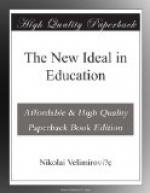THE EDUCATION WHICH MAKES FOR PEACE.
When will wars really stop in the world’s history? As soon as a new ideal of education is realised. What is this new ideal of education which makes for peace? I will give it in one word: Panhumanism. This word includes all I wish to say.
Individualism means a brick, Panhumanism means a building. Even the greatest individuality (may it be Caesar, or Raphael, or Luther) is no more than a brick in the panhuman building of history. The lives of individuals are only the points, whereas the life of mankind is a form, a deep, high and large form.
If a great and original individuality were the aim of history, I think history should stop with the first man upon earth, for our first ancestor must have been the most striking individual who ever existed. Men coming after Adam have been like their parents and each other. Kaiser William is not such an interesting and striking a creature by far as the first man was. When Kaiser William opens his mouth to speak, he speaks words that are known. When he moves or sits, when he eats or prays—all that is a nuance only of what other people do, all is either from heritage or imitation, and quite an insignificant amount is individual. Whereas every sound that the first man uttered was quite new for the Universe; every movement striking and dramatic; every look of his eyes was discovering new worlds; every joy or sorrow violently felt; every struggle a great accumulation of experiences. And so forth. Well, if one striking individuum is the aim of history, history should close with the death of Adam. But history still continues. Why? Just because not Adam was its aim, but mankind; not one, or two, or ten heroes, but millions of human creatures; not some few great men, but all men, all together, all without exception.
From this point of view we get the true ideal of education. The purpose of education is not to make grand personalities, but to make bricks for the building, i.e., to make suitable members of a collective body and suitable workers of a collective work.




